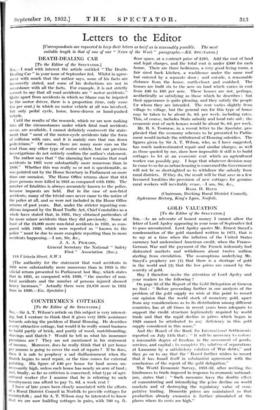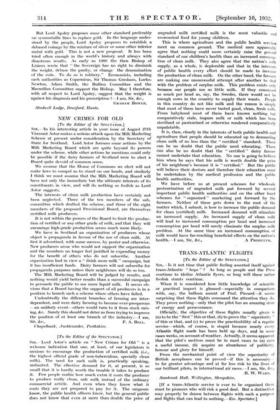GOLD VALUATION
[To the Editor of the SPECTATOR.] SIR,—As an advocate of honest money I cannot allow the letter of Lord Apsley appearing in your issue of September 3rd to pass uncontested. Lord Apsley quotes Mr. Ernest Sneyd's condemnation of the gold standard written in 1871, that is to say at a time when the inflation of the United States currency had undermined American credit, when the Franco- German War and the payment of the French indemnity had dislocated markets and withdrawn about twelve million sterling from circulation. The assumptions underlying Mr. Sneyd's prophecy are (1) that there is a shortage of gold in the world and (2) that the low prices are caused by the scarcity of gold.
May I therefore invite the attention of Lord Apsley and your readers to the following ?
On page 32 of the Report of the Gold Delegation at Geneva we find : "Before proceeding further in our analysis of the problem of the gold supply we wish at this point to record our opinion that the world stock of monetary gold, apart from any considerations as to its distribution among different countries, has at all times in recent years been adequate to support the credit structure legitimately required by world trade and that the rapid decline in prices which began in 1929 cannot be attributed to any deficiency in this gold supply considered in this sense."
And the Board of the Bank for International Settlements reported on July 11th that : " It will be necessary to restore a reasonable degree of freedom in the movement of goods,. services, and capital ; to complete the solution of reparations at Lausanne by a satisfactory solution of War debts,- and they go on to say that the "Board further wishes to record that it has found itself in substantial. agreement with the conclusions of the report of the gold delegation."
The World Economic Survey, 1931-32, after reciting the hindrances to trade imposed in response to economic national- ism, states that : "Such measures have the double effect of concentrating and intensifying the price decline on world markets and of destroying the regulatory value of com- petitive trading.. Domestic prices are maintained so that production already excessive is further stimulated at the places where its costs are high." But Lord Apsley proposes some other standard preferably on symmetallic lines to replace gold. In the language under- stood by the people, Lord Apsley proposes to establish a debased coinage by the mixture of silver or some other inferior metal with gold. This is not a new proposal. It has been tried often enough in the world's history and always with disastrous results. As early as 1366 the then Bishop of Lisieux wrote that "the Sovereign has no right to diminish the weight, debase the purity, or change the denomination of the coin. To do so is robbery." Economists, including such authorities as Copernicus, Sir Thomas Gresham, Locke, Newton, Adam Smith, the Bullion Committee and the Macmillan Committee support the Bishop. May I therefore, with all respect to Lord Apsley, suggest that the weight is against his diagnosis and his prescription ?—I am, Sir, &c., Studwell Lodge, Droxford,
GRAIIAM BOWER,































 Previous page
Previous page